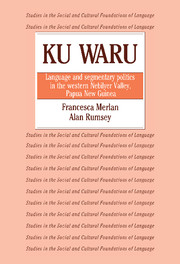Book contents
- Frontmatter
- Contents
- List of illustrations
- List of tables
- List of abbreviations
- Preface and acknowledgments
- 1 Introduction
- 2 The setting
- 3 Some aspects of Ku Waru segmentary sociality
- 4 Ceremonial exchange and marriage in the western Nebilyer Valley
- 5 Some linguistic structures of segmentary politics
- 6 Warfare compensation payment to Laulku: an analysis
- 7 Compensation at Palimung and the Kulka women's club
- 8 The events in perspective
- 9 Perspectives on ‘event’
- Appendix A Transcript of proceedings at Kailge on July 24, 1983
- Appendix B Grammatical sketch of Bo Ung, Ku Waru dialect
- Appendix C The conduct of warfare
- Appendix D Ku Waru metalinguistic expressions
- Chapter notes
- Glossary
- References
- Index
- Plate section
7 - Compensation at Palimung and the Kulka women's club
Published online by Cambridge University Press: 30 December 2009
- Frontmatter
- Contents
- List of illustrations
- List of tables
- List of abbreviations
- Preface and acknowledgments
- 1 Introduction
- 2 The setting
- 3 Some aspects of Ku Waru segmentary sociality
- 4 Ceremonial exchange and marriage in the western Nebilyer Valley
- 5 Some linguistic structures of segmentary politics
- 6 Warfare compensation payment to Laulku: an analysis
- 7 Compensation at Palimung and the Kulka women's club
- 8 The events in perspective
- 9 Perspectives on ‘event’
- Appendix A Transcript of proceedings at Kailge on July 24, 1983
- Appendix B Grammatical sketch of Bo Ung, Ku Waru dialect
- Appendix C The conduct of warfare
- Appendix D Ku Waru metalinguistic expressions
- Chapter notes
- Glossary
- References
- Index
- Plate section
Summary
On August 14, 1983, a large gathering came together at Palimung, on the Kailge-Tega road, for the staging of the return compensation payment by the allied tribes Kusika-Midipu-Epola-Alya-Lalka (K-M-E-A-L) to Kopia-Kubuka. This was the second and final phase (on the K-M-E-A-L side) of a cycle of compensation payments resulting from the Marsupial Road War of September 1982 (see section 3.2.2 for details). The first phase, described in the previous chapter, had taken place three weeks before, on July 24.
An unusual feature of the Marsupial Road War, and of this second compensation event, was the part played by a local women's club, called the Kulka women's group. We briefly describe the formation and activities of these clubs in the western Nebilyer below, in section 7.1.
In an unprecedented initiative, members of the club marched out between the opposing sides on the battlefield, bearing the Papua New Guinea flag. With some support from provincial offices (which they had contacted), they made gifts of soft drink, cigarettes and 100 kina (from the club's accumulated money) to either side. They planted the flag and told the combatants to go home, which they eventually did.
This remarkable intervention at the battle resulted in some equally remarkable features of the compensation event, including public speaking by women. The way in which the club members represent their interests and themselves presents in some ways a startling contrast to other aspects of the event, which is otherwise dominated by segmentary, male-centered representations of social life.
- Type
- Chapter
- Information
- Ku WaruLanguage and Segmentary Politics in the Western Nebilyer Valley, Papua New Guinea, pp. 156 - 197Publisher: Cambridge University PressPrint publication year: 1991



